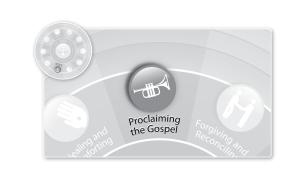 What is the best way to smuggle a Bible into a closed country? By enclosing it within the mind and heart of a well-trained Christian. That is how North Korean underground Christians proclaim the Word of God: From memory.
What is the best way to smuggle a Bible into a closed country? By enclosing it within the mind and heart of a well-trained Christian. That is how North Korean underground Christians proclaim the Word of God: From memory.
You can hide Bibles in bags of rice, suitcases of foreigners, or loads of other books, but the only surefire way for the Bible to clear any border crossing is in living form–that is, embodied in a Christian who has committed the Word of God extensively to memory.
Westerners and others from highly literate cultures are conditioned to think of memory as unreliable and fragile, yet as we’ve shared previously, the average Christian in the United States owns nine Bibles and is actively shopping for a tenth…yet biblical literacy is on a free-fall even among evangelical Christians.
So it turns out that what is external to us is actually far more fragile than what is internal. And this is why Christians in North Korea–and many other persecuting countries–emphasize memorization of large sections and whole books of the Bible, not just selected verses. And so underground North Korean Christians often end up memorizing more Scripture in just six months than many Western Christians do in a lifetime.
Sure, our Seoul USA organization still covertly distributes bibles and Christian literature in North Korea. But it is not the heart of our strategy. Discipling Christians to be living Bibles, capable of carrying the Word of God in their minds and hearts across every border, into any conversation, is what we’re all about. And it is what the church was all about for a longer stretch of her history than we modern highly literate high disposable income types can fathom.
One final excerpt here before we publish the book this fall on Mr. and Mrs. Bae, the third generation North Korean underground Christians. Here, Mr. Bae talks about his mother and his grandfather, and how the Word of God passed underground from first generation to second to third in his own family. As you read, consider how nowhere in Scripture are we called to smuggle Bibles. That doesn’t make it wrong, of course. But what is unfortunate is our misplaced belief that smuggling Bibles is a sufficient and cost-effective substitute for raising up Living Bibles. Would that more persecuted church ministry was focused on the latter than the former.
Would that most Western churches were, too.
I used to go along with my mother to many places. One day, my mom asked my grandfather if he would accompany us on a walk. She couldn’t talk freely in the house for fear that it had been bugged. At that time, in 1970, the government was on a campaign to exterminate all Christians, so believers were very careful to take precautions against bugging devices.
My mom asked my grandfather, “Dad, did you really hear God’s voice?” When he told her yes, she pressed him for all the details. He shared how God’s voice was especially clear to him when he fasted, prayed, or slept. My mom told him that she’d like to hear God as he had heard. She was sad that she couldn’t hear God, wondering how much deeper her dad’s faith was than hers.
At that time, she was in her thirties and curious about her faith. She kept asking him about Noah’s Ark, Sodom and Gomorrah, and the way people were created. Because there were no Bibles at that time in North Korea, her father became her living Bible. And she learned well. After he died, she passed those Bible stories on to me, all from memory. That’s how we came to know the Ten Commandments and a few hymn songs too.
After my grandfather died and we were exiled to live in the farming area, we didn’t pray before meals. Too dangerous, my mom said. But she still gathered us children together, often overnight, to give us lessons just like my grandfather had given her and her siblings each week—that we should live in accordance with the Ten Commandments and that we should remember what happened to Sodom and Gomorrah. She told us stories about Moses too—how his mother placed him in a basket and put it among the reeds along the bank of the Nile. It was fun to hear her tell us these old stories, but her purpose was never to entertain. The point was always the same, especially when we were going through the hardest times: God always watches us wherever we are, and he sees whatever we do. She wanted us to remember that, and she wanted us not to sin.
Excerpted from These are the Generations by Eric Foley. Copyright © 2012 by .W Publishing. All rights reserved.











This post convicts me of how when I first met Christ, I couldn’t get enough of the word. Better than any book, I read it and personalized it. I stored it away. Even growing up in the church, the word seemed to jump from the pages. Fresh perspectives on the stories I knew.
How could I not want to memorize it. But, as we become “veterans,” scripture is just an thing on our to-do list.
Eric, I know you meant this for us to understand the plight of North Korean believers, but its really a statement of how valuable the word must be to us to, as well.
It’s so simple it sounds just like a cliche to say it.
Great insight, Dean–definitely no mere cliche. I think you’re right on. Ten years ago I thought I was called to help the North Korean Church. Today I believe I was called at least as much if not more so to enable the North Korean church to help us!